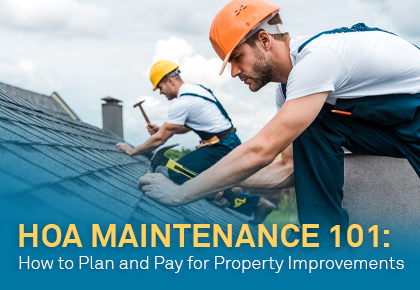Narrow Results
-

Capital Reserve Fund vs. Capital Improvements for Texas HOAs
Capital reserve fund vs. improvements: Budget for both and know when and how to allocate them in your Texas HOA for a continuously improved community. -
-
Special Assessments: Fund Your Capital Improvement Assessment: Part III
Learn about special assessments as a way to fund unexpected capital improvements -
Prioritizing and Managing Your Community's Property Maintenance and Improvement Needs
Handling day-to-day maintenance and making necessary improvements are critical responsibilities for any homeowners association (HOA). And when your serve on your association’s board of directors, they can quickly become overwhelming if you don’t have a good system in place to manage them. So how do you make sure that your maintenance staff is able to handle that long list of tasks that need to get done so that your community runs smoothly and retains its appeal? -
5 Steps to the Best Reserve Study Firm
Your reserve study is important to your financial health, but how do you get one? How do you choose the right reserve study firm to conduct it? Learn more. -
Slow and Steady: 5 Surprising Benefits of Raising Your Dues
It’s that time of year again – budget season is upon us. You know the things to consider when creating your budget, but what drives your process? Are you focused on achieving a particular vision for your community? Avoiding conflict in the community? Solely looking to avoid increasing dues/contributions? -
Four Steps to Healthy Finances
Keeping your condominium corporation’s finances healthy is much like keeping yourself physically fit. The key is to make smart choices and avoid over-indulgence. -
Preventative & Predictive Maintenance are Critical to Your Replacement Reserves
Reserve Fund Studies are based on the assumption that components will reach their maximum useful life. However, if a preventative maintenance plan doesn’t accompany your reserve study, it’s highly unlikely some components will ever reach their maximum useful life. -
Preventative Roof Maintenance is Crucial to the Sustainability and Longevity of Your Roof
We can all agree there are many important elements to a housing structure, but your roof is probably the most important. Changing temperatures, snow accumulation, large amounts of rain, ice dams and high winds can all cause major damage to condominiums, townhomes and single-family homes. These harsh weather conditions can create all sorts of problems, from minor leaks to major cave-ins that can cost a condominium corporation thousands to repair. -
Smart Financial Planning
Safeguarding a condominium corporation’s operating and reserve funds is one of the main fiduciary duties of all board members, not just the treasurer. This means that boards must protect the financial interests of the corporation and its members by making sure all funds are properly managed, invested and protected. -
Condo Capital Improvements: Lending Solutions for Condominium and Co-op Boards
FirstService Residential and FirstService Financial work in tandem to help our clients successfully finance capital improvement projects and save money without compromising quality of service. -
Local Law 152: Updated Requirements for Boards and Buildings
Is your building prepared for Local Law 152 gas piping inspections? FirstService Residential recommends getting ahead of schedule to avoid unforeseen deficiencies and costly fines. -
Planning Your Next Virtual Annual Meeting
For New York City co-op and condo boards, virtual annual meetings are the new normal. FirstService Residential is here to help make your transition as seamless as possible. -
Tax Certiorari: Fast Facts for Boards and Owners in New York City
FirstService Residential managed properties have access to the tax certiorari experts at Goldberg Weprin Finkel Goldstein LLP, the premier firm in this specialized field. -

FISP (Local Law 11) - Understanding Cycle 9 Requirements in NYC
FirstService Residential has invested substantial resources to facilitate each of our managed properties with facade inspections and is here to help you navigate the many intricacies of FISP. -
Reserve Fund? Special Assessment? Loan? 3 Ways to Fund Capital Improvements
Great capital improvements improve property values. Read on to see the three ways to pay for them and the pros and cons. -

Market Trends & Best Practices: Property Insurance for Boards & Building Owners in 2021
Around the world, the property and casualty insurance industry experienced record losses from 2016 to 2019, and consumers are now feeling the effects on both a macro and micro scale. -

Mitigating Board Liability & Personal Exposure – Part One
A capable management company will enforce procedures and invest in technologies that help limit legal liability for the condo or co-op, and also mitigate board member personal exposure. -

Automating Compliance & Inspections for Multifamily Buildings in NYC
Robust automation software can help boards and building owners in New York City satisfy local law compliance deadlines and inspection cycles. -

Mitigating Board Liability & Personal Exposure – Part Two
Policy exclusions introduce increased risk to the board and often render a contractor’s policy meaningless. Properly vetting a contractor’s insurance is critical. -

Local Law 97 Updates: Building Energy Grades & Emissions Compliance
Local Law 97 impacts roughly 50,000 buildings across the city, a majority of which are multifamily residential properties. -

Residential EV Charging Stations: Benefits & Incentives for Multifamily Buildings
FirstService Residential recommends that all boards and building owners consider the installation of EV charging stations and incentives available through NYSERDA and ConEd. -

Understanding a Co-Op and Condo Reserve Fund & Strategic Budgeting
With an effective reserve-fund strategy, boards can properly plan for unplanned equipment replacements and repairs to building systems and facilities. -

HOA Maintenance Checklist: Planning and Paying for Property Improvements
Want to keep your HOA or high-rise in tip-top shape for current and future residents? Learn how to plan and pay for maintenance and capital improvements.